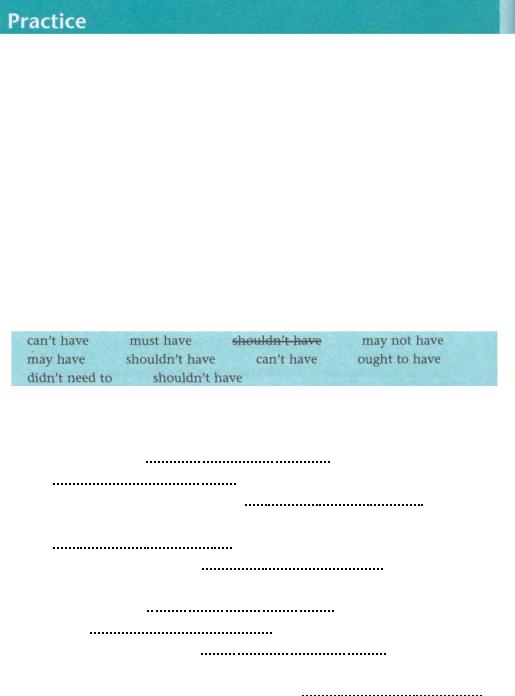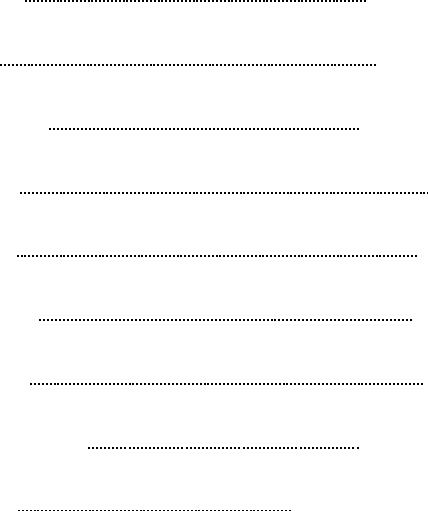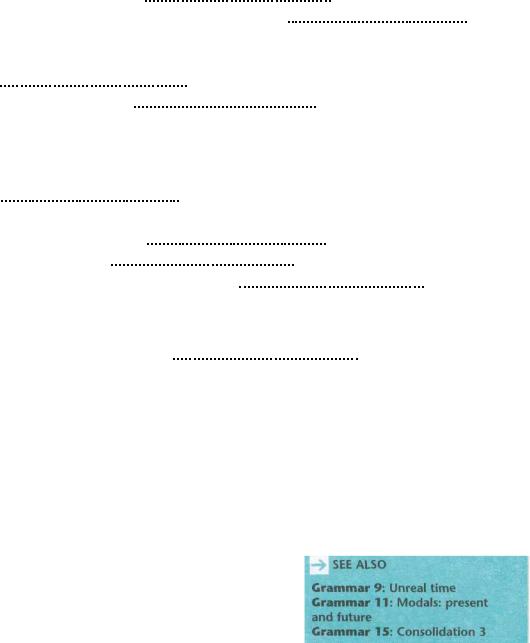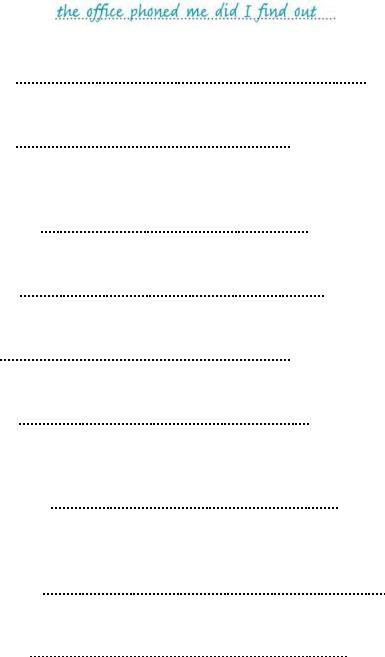
3_Macmillan_-_Advanced_Language_Practise
.pdf
Had to and must have
Should have and ought to have
Couldhave
Could
Explanations
Had to is the past form of must and refers to a past obligation.
Sorry I'm late, I had to post some letters.
The negative form is didn't have to and refers to an absence of obligation. Must have refers to past certainty, (see below)
Where *should appears, ought to is also possible.
•Expectation
Should have refers to something which was supposed to happen.
The parcel I sent you *should have arrived by now.
•Criticism of an action
You *shouldn't have eaten so much last night.
• Should have and verbs of thinking
The past form knew in the example is an unreal verb form, and the should have form is used according to 'sequence of verb forms'. See Grammar 9.
/should have thought you knew.
•With be and adjectives describing chance
It was strange that you should have been staying in the same hotel last year.
• As a polite expression of thanks on receiving a gift or a favour
I've done the washing up for you. - Oh, you really shouldn't have!
The intonation should be friendly, as this is not a criticism.
• Could have refers to past possibility or uncertainty.
David could have won the race if he had tried, (possibility/ability)
It could have been Sue, I suppose, (uncertainty)
•Couldn't have is also possible for both meanings.
•Couldn't have can be used with comparative adjectives.
We couldn't have been happier in those days.
•Could have can also express unwillingness.
She could have gone to the party with her friends, (but she didn't) We couldn't have left the dog on its own. (so we didn't)
• Could refers to past permission or past ability.
When I was sixteen I could stay out till 11.00. (I was allowed to) Mary could swim when she was three, (she actually did)
•Compare:
Mary could have swum when she was three, (but she didn't)
72
G R A M M A R 12 MODALS: PAST
May have and |
• Might have refers to past possibility which did not happen. |
might have |
You might have drowned! |
|
• Might have and may have refer to uncertainty. |
|
/ suppose I may have been rather critical. |
|
• Both can be used in the negative to express uncertainty. |
|
They might not have received our letter yet. |
|
• Might have is used to express annoyance at someone's failure to do |
|
something. There is strong stress on the words underlined. |
|
You might have told me my trousers were split! |
|
• / might have known + would is an idiom by which the speaker expresses |
|
ironically that an action was typical of someone else. |
|
/ might have known that he would be late. |
|
A: It was Jack who broke the vase. B: / might have known! |
Must have and |
• These refer to the speaker's certainty about a past action. |
can't have |
Someone must have taken it. (I am sure they did) |
|
You can't have lost it. (I am sure you didn't) |
|
• Both can also be used with surely in exclamations. |
|
Surely you can't have eaten all of it! |
|
Surely you must have noticed it! |
Would not |
• This expresses an unwillingness in the past. |
|
Everyone was angry because Sam wouldn't turn off the television. |
Would have |
• Would have can refer to events in the past which did not actually happen. |
|
/ would have accepted this job, but I didn't want to move house. |
|
• Assumptions about the past are also possible with would have. |
|
A: Someone called after you left but didn't leave a message. |
|
B: That would have been Cathy, probably. |
Needn't have and |
Needn't have done refers to an unnecessary action which was actually done. |
didn't need to |
You needn't have paid all at once, (you did pay) |
|
Didn't need to refers to an unnecessary action which was not done. |
|
/ didn't need to go to the dentist again, luckily. |
Adverbs and |
Adverbs such as well, easily, obviously, really, just are often used to emphasise |
modals |
modal expressions, in both present and past time. |
|
You could easily have been killed. |
|
I might well decide to come. |
|
She obviously must have left. |
|
You couldn't really have managed without me. |
|
I might just take you up on that. |
73

A D V A N C E D L A N G U A G E PRACTICE
1Underline the correct word or phrase in each sentence.
a)That can't have been/shouldn't have been Nick that you saw.
b)You must have given/might have given me a hand!
c)I caught a later train because I had to see/must have seen a client.
d)I suppose Bill should have lost/might have lost his way.
e)I didn't refuse the cake, as it should have been/would have been rude.
f)I don't know who rang, but it could have been/must have been Jim.
g)It was odd that you should have bought/would have bought the same car.
h)I asked them to leave but they might not/wouldn't go.
i)It's a pity you didn't ask because I can't help/could have helped you.
j)It's your own fault, you can't have/shouldn't have gone to bed so late.
2Complete each sentence using one of the phrases from the box.
a) You and your big mouth! It was supposed to be a secret. You  told her!
told her!
b) The plane is late. It |
|
landed by now. |
c) You |
met my brother. I haven't got one! |
|
d) There is only one explanation. You |
left your |
|
keys on the bus. |
|
|
e) You |
heard me right. I definitely said 204525. |
|
f) The meat is a bit burnt. You |
|
cooked it for so |
long. |
|
|
g) I'm sorry. I accept I |
|
been a little bit rude. |
h) You really |
|
taken so much trouble over me. |
i) Was it really necessary? You |
|
tell the police, you |
know, |
|
|
j)Keep your fingers crossed! The traffic warden noticed the car's parking ticket has run out!
74

G R A M M AR 12 MODALS : PAST
3 Complete the second sentence so that it has a similar meaning to the first sentence, using the word given. Do not change the word given.
a)It wouldn't have been right to leave you to do all the work on your own.
couldn't
 all the work on your own.
all the work on your own.
b)Perhaps they didn't notice the tyre was flat.
|
might |
|
|
They |
the tyre was flat. |
c) |
All that trouble I went to wasn't necessary in the end. |
|
|
needn't |
|
|
I |
all that trouble. |
d) Apparently someone has borrowed the cassette player. |
|
|
|
have |
|
|
Someone |
the cassette player. |
e) |
I'm disappointed that you didn't back me up! |
|
|
might |
|
|
You |
me up! |
f)Our worrying so much was a waste of time. needn't
|
We |
so much. |
g) |
It's just not possible for the cat to have opened the fridge. |
|
|
possibly |
|
|
The cat |
the fridge. |
h) |
It would have been possible for Helen to take us in her car. |
|
|
could |
|
|
Helen |
us a lift. |
i) It's possible that the last person to leave didn't lock the door. |
||
|
might |
|
|
The last person |
the door unlocked. |
j)School uniform wasn't compulsory at my school. wear
We |
school uniform at my school. |
75

ADVANCED LANGUAGE PRACTICE
4 Complete each sentence by writing one word in each space. Contractions (can't)
count as one word. |
|
||
a) |
I |
have become a millionaire, but I decided not to. |
|
b) You |
have been here when Helen told the boss not to be so |
||
|
lazy! It was great! |
|
|
c) |
Peter wasn't here then, so he |
have broken your vase. |
|
d) I |
have bought that car, but I decided to look at a few others. |
||
e) |
If you felt lonely, you |
have given me a ring. |
|
f) |
Don't take a risk like that again! We |
have lost because of you. |
|
g) It's been more than a week! You |
have had some news by now! |
||
h) We were glad to help. We |
have just stood by and done |
||
|
nothing. |
|
|
i) |
You really |
have gone to so much trouble! |
|
j) |
I |
have thought that it was rather difficult. |
|
5Correct any errors in these sentences. Some sentences are correct.
a)Surely you mustn't have forgotten already! 
b)Even Paul couldn't have foreseen what was coming next ..................
c)Frances might not have understood what you said ..................
d)It was funny that she should have remembered me ..................
e)Harry may have won the match with a bit more effort ..................
f)You must have told me you had already eaten ..................
g)Look, there's £30 in my wallet. I shouldn't have gone to the bank after all.
h)You mustn't have been so unkind!
i)I couldn't have managed without you
j)I have no idea who it was, but I suppose it would have been Ann
6Underline the most suitable adverb for each space.
a)Someone obviously/currently/fortunately must have picked it up by mistake.
b)He could really/cheerfully/easily have stolen the painting without anyone knowing.
c)I may surely/well/dearly have made a mistake.
d)You really/clearly/needlessly shouldn't have spent so much on my present.
e)Bill rarely/simply/certainly wouldn't listen to anything we said.
f)I couldn't just/yet/already have left without saying a word.
g)Certainly/Rarely/Surely you can't seriously believe that I am guilty!
h)I opened the window, I greatly/surely/simply had to get some fresh air.
i)I still/unfortunately'/surely couldn't have come to your party,
j)How dangerous! You could still/strongly/well have been injured!

G R A M M AR 12 MODALS : PAST
7 Complete each space in the text with an appropriate modal verb. Some are negative.
Dear Toshie,
Thanks for sending back the book I lent you. You (1)  read it already! You must be the world's fastest reader! Hope you enjoyed it.
read it already! You must be the world's fastest reader! Hope you enjoyed it.
Well, the big news is, I decided not to go to Italy to take up my job offer.
Basically, moving there (2) meant a lot of upheaval
and frankly I couldn't face the hassle. Maybe I (3)
just gone, and been a bit more adventurous, and for sure, I've got mixed feelings about it, as if part of me wanted to go. Who knows, I
(4) |
met the man of my dreams! But I didn't take |
the decision lightly. I (5) |
spent several weeks |
thinking about nothing else. Anyway, what's done is done.
My other news concerns my Dad. You remember I was getting very worried because he'd been having dizzy spells and feeling all light-headed. Well, I
(6) worried - he's been diagnosed as suffering from
low blood pressure, so he's on medication for that. The doctor said it's possible
that his vegetarian diet (7) |
set it off. It's a pity you |
weren't here! You (8) |
been able to help Dad, with |
your interest in holistic medicine. You (9) |
given |
him some of your aromatherapy treatments. |
|
Anyway, hope to see you again before too long. By the way, guess who's getting married in June? Brenda! I (10) known it would be her! It's typical; that girl has all the luck!
Bye!
Love from, Sue
77

Explanations
Inversion |
The term inversion covers two different grammatical operations. |
|
|
• Using a question form of the main verb |
|
|
Not only did he fail to |
report the accident, but also later denied that he had |
|
been driving the car. |
|
|
Never have I enjoyed |
myself more! |
|
• Changing the normal positions of verb and subject |
|
Along the street came a strange procession. |
|
See Grammar 14 for an explanation of this example. |
Inversion after |
• This only occurs when the adverbial occurs at the beginning of a clause. |
negative |
All the examples below are used in formal language, usually for rhetorical |
adverbials |
effect, such as in political speeches. They are not usual in everyday spoken |
|
language. Compare: |
|
Never have I heard a weaker excuse! |
|
I have never heard a weaker excuse! |
•Time expressions: never, rarely, seldom
These are most commonly used with present perfect or past perfect, or with modals such as can and could. Sentences of this type often contain comparatives.
Rarely can a minister have been faced with such a problem.
Seldom has the team given a worse performance.
Rarely had I had so much responsibility.
•Time expressions: hardly, barely, scarcely, no sooner
These refer to an event which quickly follows another in the past. They are usually used with past perfect, although no sooner can be followed by past simple. Note the words used in the contrasting clause.
Hardly had the train left the station, when there was an explosion.
Scarcely had I entered the room when the phone rang.
No sooner had I reached the door than I realised it was locked.
No sooner was the team back on the pitch than it started raining.
•After only
Here only combines with other time expressions and is usually used with past simple.
Only after posting the letter did 1 remember that I had forgotten to put on a stamp.
Other examples are only if/when, only then, only later.
78
G R A M M A R 13 INVERSIO N
|
|
Note that when only refers to 'the state of being the only one', there is no |
|
|
|
inversion following it. |
|
|
|
Only Mary realised that the door was not locked. |
|
|
• |
Phrases containing no/not |
|
|
|
These include under no circumstances, on no account, at no time, in no way, on |
|
|
|
no condition, not until, not only ... (but also). |
|
|
|
On no condition are they to open fire without a warning. |
|
|
|
Not until I got home did I notice that I had the wrong umbrella. |
|
|
• |
Little |
|
|
|
Little also has a negative or restrictive meaning in this sense: |
|
|
|
Little does the government appreciate what the results will be. |
|
Inversion after |
• |
This occurs with so and adjectives when the main verb is be. It is used for |
|
so/such with that |
|
emphasis and is more common than the example with such. |
|
|
|
So devastating were the floods that some areas may never recover. |
|
|
• |
Such used with be means so much/so great |
|
|
|
Such was the force of the storm that trees were uprooted. |
|
|
• |
As in the examples with such, inversion only occurs if so/such is the first |
|
|
|
word in the clause. |
|
Inverted |
• |
Three types of If- sentence can be inverted without If-. This makes the |
|
conditional |
|
sentences more formal and makes the event less likely. |
|
sentences without |
|
If they were to escape, |
there would be an outcry. |
If- |
|
Were they to escape, |
there would be an outcry. |
|
|
If the police had found out, I would have been in trouble. |
|
|
|
Were the police to have found out, I would have been in trouble. |
|
|
|
If you should hear anything, let me know. |
|
|
|
Should you hear anything, let me know. |
|
|
|
If he has cheated, he will have to be punished. |
|
|
|
Should he have cheated, he will have to be punished. |
|
|
|
If I had known, I would have protested strongly. |
|
|
|
Had I known, I would have protested strongly. |
|
|
• |
Inversion after as |
|
|
|
This is more common in formal or written language. |
|
We were short ofmoney, as were most people in our neighbourhood.
I thought, as did my colleagues, that the recession would soon be over.
•Inversion after so, neither and nor
These are used in 'echoing' statements, agreeing or disagreeing.
A: / am going home. B: So am I.
A: / don't like meat. B: Neither do I.
See Grammar 14 for ways of giving emphasis without inverting after so.
79

A D V A N C E D LANGUAGE PRACTIC E
Complete each sentence by using the phrases from the box.
a) |
we arrived at the hotel, when there was a power |
cut. |
|
b) |
members of staff to accept gratuities from |
clients. |
|
c) |
Detective Dawson realise what she was to |
discover! |
|
d) |
to pay the full amount now, there would be a |
ten per cent |
discount. |
e) I supposed, |
most people, that I would be |
retiring at 60. |
|
f) |
the doctors seen a more difficult case. |
g) |
Jean win first prize, but she was also offered a |
promotion. |
|
h) |
late arrivals be admitted to the theatre before |
the interval, |
|
i) |
one missing child been found, than another |
three disappeared, |
|
j) |
so many employees taken sick leave at the same |
time. |
|
80

G R A M M AR 13 INVERSIO N
2 Complete the second sentence so that it has a similar meaning to the first sentence, using the word given. Do not change the word given.
a) It was only when the office phoned me that I found out about the meeting.
find |
|
Not until , |
about the meeting. |
b) The facts were not all made public at the time. |
|
later |
|
Only |
all made public. |
c)The response to our appeal was so great that we had to take on more staff. response
Such |
to our appeal that we had to |
take on more staff. |
|
d)Harry broke his leg, and also injured his shoulder. but
Not only |
also injured his shoulder. |
e)The police didn't suspect at all that the judge was the murderer. did
|
Little |
as being the murderer. |
f) The bus driver cannot be blamed for the accident in any way. |
||
|
held |
|
|
In |
responsible for the accident. |
g) |
If the government raised interest rates, they would lose the election. |
|
|
raise |
|
|
Were |
interest rates, they would |
|
lose the election, |
|
h) |
As soon as I got home, I realised I'd left my bag in the shops. |
|
|
had |
|
|
No sooner |
I realised I'd left my |
|
bag in the shops, |
|
i)It was only when I asked a passer-by that I realised where I was. did
Not until |
where I was. |
j) The minister was interrupted just after starting his speech.
when
Hardly |
he was interrupted. |
81
